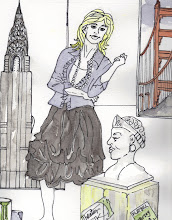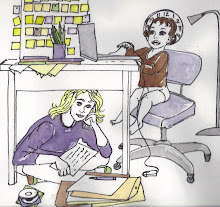By now, it is clearly evident to the reader that I was raised Protestant, or some such, because it took me so very long - despite my indefatigable quest for knowledge - to recognize the Epiphany practice of the blessing of homes and churches and just about any other structure, apparently. (In my home, we always felt that the house was blessed if we could pay the light bill – illumination being a form of grace.) So it won’t surprise you, then, to learn that I was also flummoxed by the number of churches scattered across these Bavarian Jurassic Park-like hills. The Baroque churches, which look like miniature Orthodox structures, are easy to spot as they are mostly all capped by comfortable-looking onion tops, not unlike what persists over the top of my belted jeans. The Baroque style of construction was a response to the Protestant reformation and the sense that the Church’s architecture could be more emotionally accessible to the people, (In my experience, cabbies in New York City, capably filling the silence as they crawl along 5th or Madison Avenue past St. Patrick’s, will say the very same thing) all the while conveying the wealth and power of the church. Quite effectively, like kindred minarets in the Muslim world, the church spires point heavenward while conveying a sense that Big Brother (literally, fratres) has his eye on the village imbibers from a rather terrific vantage point. Looking across the high moors that make up the Upper Palatine plateau, the only structures that seem to be as prominent as the churches are the breweries, or the places in which one consumes the products flowing out of the breweries. Now it occurs to me (as it probably did to you if your college years were similar to mine) that there is an inherent difficulty in having an equivalent number of taverns and churches in a small town. The good news, here, is that there is a church within walking distance of every neighborhood in the village, an attribute one can particularly appreciate if one’s spouse insists that one is still – after last night - not in a state to take the family car on Sunday morning. No more than about two dozen parishioners can fit in one of these neighborhood churches. An empty spot in a pew would stand out like a sore thumb and, perchance, encourage the priest to head for the doorstep of the budding scofflaw. The company you’re likely to keep while doing your part to ensure the perpetuity of German drinking songs is also the company you’ll see when you slip into your pew - or not - on Sunday. That feeling of brotherhood conveyed by the motto, Einen fur alle, alle fur einen, in letters 12 feet tall on the sides of the breweries, conceivably was fostered by the Saturday night practice of Ale fur alle und alle fur ale. The sense that “we are all in this together, boys, so get your stories straight” would not be lost on der Volk.
The villagers were not seeing me in church so, to counter this, I was doing my best to make appearances wherever there was beer. The problem was, even when direly thirsty, I couldn’t make my way to the bottom of a typical German beer glass, not to mention a decent-sized stein. My posing lacked authenticity. It was as though every passing German could tell that I would prefer a twinkling little glass of St. Germaine to a cloudy wheat beer with a banana aftertaste. I wasn’t winning friends or, for that matter, drinking buddies.
My daughter, who looks Italian or Turkish (note that Germans are not particularly fond of the Turks who flooded into their country after the war and made good livelihoods from the rebuilding efforts, or Italians - you know that story), had warned me that Germans tend to stare openly at strangers. I suspected this practice might be exaggerated in a village where everyone knew everyone else (having shared Saturday night fever, doubtless followed on Sunday morning by mildly aching heads, the suffering made slightly more acute by shoulder-to-shoulder pious kneeling). I thought I’d have a better time of it, given that, with my blue eyes and blonde hair, I look more German than most of the nationals I was seeing. But, this was not to be. I collected blank stares left and right, regardless of my open, smiling, American demeanor (which, roughly translated in Bavarian, apparently meant “simple minded”).
Historian Michael Sturmer had written that German diversity stems from differences in “bread and beer, in customs, language, and the local law.” To this list, I would add religion, and preferences regarding the local wurst. (Long-standing competition regarding regional production of a signature wurst is taken very seriously in Germany and has uncannily elevated the sausage to gourmet status.) How, then, might the Badeners or Prussians differ from the Bavarians? I wondered if this reserved (read: aloof) attitude was Bavarian or just small town? After meeting a couple from Munich on the trail to my village’s very own castle ruins, I lean toward the small town explanation. With virtually no one else on the trail (a condition I’ve come to believe is more common than not because, these are really truly just ruins, with no colorful souvenir shops or re-enactments or traditionally dressed guides), the couple from Munich ecstatically hailed me, and hearing my accent, asked me if I was from California. Not wanting to disappoint them, I said I was, and felt very much like I’d been added to a list like kids who “call” the states of license plates on a very long road trip. The couple, a mother and her apparently dutiful grown son, told me they were on a “castle tour all over,” and then enthusiastically shared with me their colorful brochure describing Hitler’s stomping grounds in a nearby town. I wondered if they would later attach little castle pins to their woolen Tyrolean hats – one for each castle visited and one very special one for the Eagles Nest. Later that afternoon, as their car careened down the cobbled street of the village – one leg of the castle tour apparently completed - they honked wildly and, upon seeing me, hollered something that sounded like “California, here we come.” From where I sat on the terrace of a local establishment, I raised my glass of (unfinished) liquid golden sunshine in return.
In most countries where there is a definite north and south sensibility, those in the other region – which is wherever you are not - seem often to be described by a string of words meant, to some degree or another, to be disparaging - pejorative terms marking them as the “other.” Though dated, Thomas Mann’s Buddenbrooks, provides a good example which is not too far from what one might find implicit even in the language of modern guidebooks. In Mann’s story, a woman born in the north marries a Bavarian but still doesn’t think much of the easy going southerners, describing those from Munich as “without dignity, morals, energy, ambition, self-respect, or good manners” in contrast to those from the north, where “people work and get things accomplished and have a purpose in life.” With these thoughts in mind, I entered the local bank after waiting for it to reopen following an hour and a half lunch break, and contemplated a crucifix on the wall just behind the bank teller. A bank employee returning a little late from lunch hurriedly greeted her co-workers. “Goose got.” “Got what?” I wondered. What could a goose get that one would think important enough to use as an excuse for being late to clock in? And everyone seemed to already know what the goose had gotten because they all just nodded at her, and looked warily at me as though I truly was the village idiot. Unbeknownst to the tellers, I had to walk past a formidable gaggle of geese on my way to the bank, and I appreciated fully that “being gotten by the geese” would not make for a very happy lunch break. The very next day, from behind her low fence along our street, an older woman looked up from her gardening and murmured the same thing - Gruß Gott – and actually smiled at me. In a month’s time, this was the first spontaneous smile that I’d received from a national, other than shopkeepers who gleefully accepted Euros from me (for a .52 on the dollar exchange rate, well they might).
Emboldened by the beer-garden familiarity of the Munich Volk encounter and figuring it worked for the bank teller, I reasoned; why not try to divert my fellow villagers with a hearty southern-style greeting. So I met the stares of the people with narrowed eyes and pinched mouths with a warm smile and a singing “Gruß Gott!” Religious folks everywhere tend to be a bit superstitious, presumably covering their bases - just in case. To ignore someone saying “God bless you” might be living just a tad too close to the edge. Whether because of reflex or a reluctance to invoke dark spirits, villagers on the street greeted me in return. Perhaps I could not so easily unloose my casual American joie de vivre in northern Germany, however, where there are fewer Catholics. Saying “God greet you” to a Berliner is likely to elicit an amused “Not too soon, I hope!”
Subscribe to:
Post Comments (Atom)








No comments:
Post a Comment